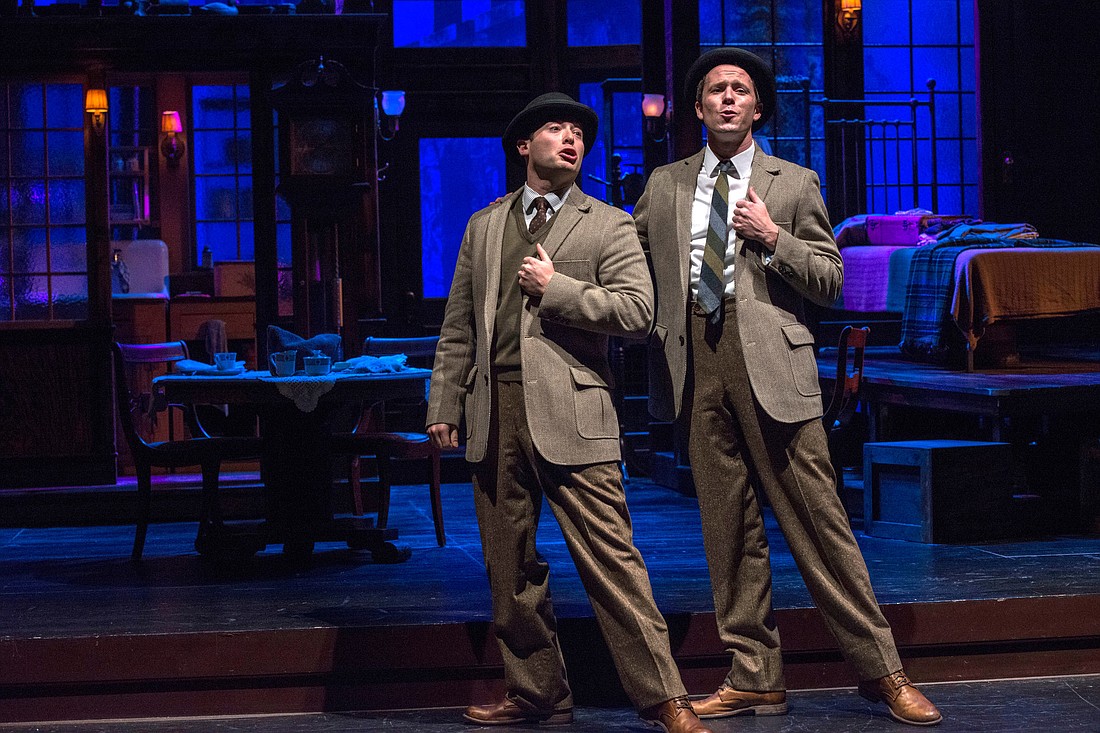- November 25, 2024
-
-
Loading

Loading

Over the years, millions of expatriates left Ireland for America. Brian Friel’s “Philadelphia Here I Come!” explains why. It’s one of the Asolo Rep’s current productions, and a trip to Ireland 1964. If you’re expecting a sentimental dream of the old country that would put a twinkle in John Ford’s eye, think again. Friel takes off the emerald-colored glasses and reveals the thing itself. Glocca Morra it ain’t.
The Ireland the playwright shows us has a kinship to the purgatory on Earth of James Joyce’s “Dubliners.” Friel’s characters are trapped; paralyzed; stuck like broken records in the same grooves. He gives us a play about conversations unsaid, secrets not revealed and stories untold. The difference is that, unlike the heroes of Joyce’s stories, Friel’s hero escapes. To Philadelphia, of course.
In the playwright’s inventive structure, the hero (Gareth aka “Gar”) is played by two actors. Bernard Balbot gives us Gar’s public self in the real world. Christian Conn portrays Gar’s private self: the skull-trapped stream-of-consciousness that wound up in Shakespeare’s soliloquies. It’s all the stuff you wanted to say but didn’t. Friel’s clever doppelganger gag lets you hear it.
What you hear and feel is a heart stuffed with love and hate of home, simultaneously. Gar isn’t a moaner. He dances and sings. (“Philadelphia Here I Come!” is one of his faves.) He’s a doer and a dreamer who longs for a land of reinvention. (The U.S., naturally.) In America, he’ll be free. In Ireland, he’s just stuck. The machinery that traps him is multi-generational and intricate.
When Gar’s father (Douglas Jones) married his mother, he was 40-something and she was 18. Mom died giving birth to our hero. Da never talks about it. Son suspects that his mother had an affair with his former teacher, the besotted Master Boyle (David Breitbarth), but married his father (an emotionally inert, but slightly prosperous shopkeeper) for security. Gar thinks that’s what happened. But Da won’t spell it out for him. Come to think of it, his father says little. Da is closed off; son is left in an emotional dead zone. Son has one happy childhood memory. His father can’t recall it. At times like these, keeping your mouth shut can be a sin. But Gar can throw no stones in that regard. It seems Gar loved a woman but did not inform her father because he saw himself as a loser. Gar didn’t know what to say, so what he said was silence. He is his father’s son, after all. But he’s determined to break that pattern.
Director Frank Galati deftly shows you the pattern. He makes Friel’s fragmented, inventive structure come alive. (Put any sentimental notions of Olde Ireland aside; this is, at heart, an experimental play.) Gar is fighting to free himself from the machinery of karma. Instead of telling his tale conventionally, Friel turns him inside-out and pours the contents of his heart and mind all over the stage. Galati approaches this material with pitch-perfect storytelling. His staging is so clear and so specific that you never miss a beat.
The actors keep excellent time, too. Balbot and Conn are alternately heartbreaking and hilarious as Official Gar and Inner Gar. “All the world is a stage,” as you-know-who once said. It follows that not all the world’s actors are in Actors' Equity and everyone is playing a part — or two. In Friel’s play, the two parts of Gar make for a great vaudeville team. It’s a tour de force performance, but not the only one. Amanda Lynn Mullen is fine as Kate Doogan — the girl Gar could not get, or he could not work up the nerve to broach the subject of marriage to her gruff father (Mark Konrad). Breitbarth shines as the ironically titled “Master”— shines in the sense of conveying a shining mind ground into drunken dullness by inner cowardice and outer conventionality. With just a few lines, Breitbarth implies a lifetime of history. Gar’s father (S.B. O’Donnell aka “Screwball) is pivotal, but he has even fewer lines. Gar can predict them all, as he does in the mordantly comic scene between his father and the fatuous priest (Andrew Sellon). Jones plays Gar’s father as an absence. He’s the man who isn’t there. Peggy Roeder’s Madge is the most open-hearted of any character — a stand-in for the mother who isn’t there, within limits. And if Master Boyle shows a great mind gone to waste, Jefferson McDonald, Brian Nemiroff and Cale Haupert show us the loutish lads (Gar’s mates) who did not have much mind power to begin with. There’s a reason nearly everybody drinks. The clockwork they are all stuck in is ancient.
So, does Gar break free of it? Could not say. According to play’s evidence, he makes the plane. Beyond that, I cannot be definitive. But I’m willing to bet he made it good in Philadelphia. Like millions of others, Gar came here to reinvent himself — and invented America in the process.
I’d like to think he succeeded.
IF YOU GO
“Philadelphia Here I Come!” runs through April 12, at the FSU Center for the Performing Arts, 5555 N. Tamiami Trail, Sarasota. Call 351-8000 or visit asolorep.org for more information.